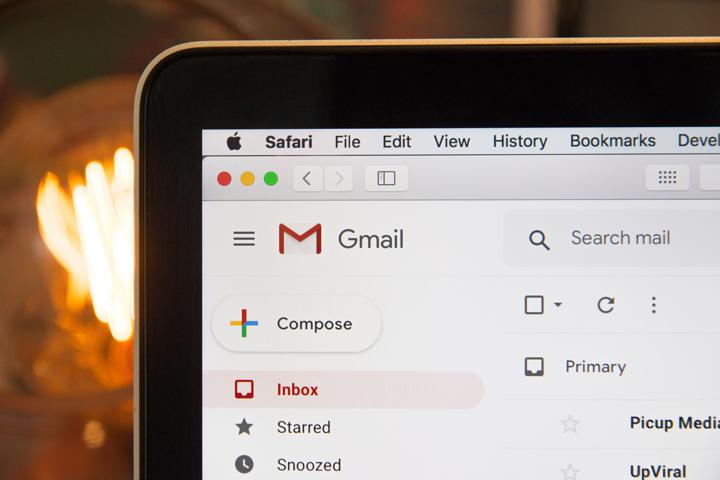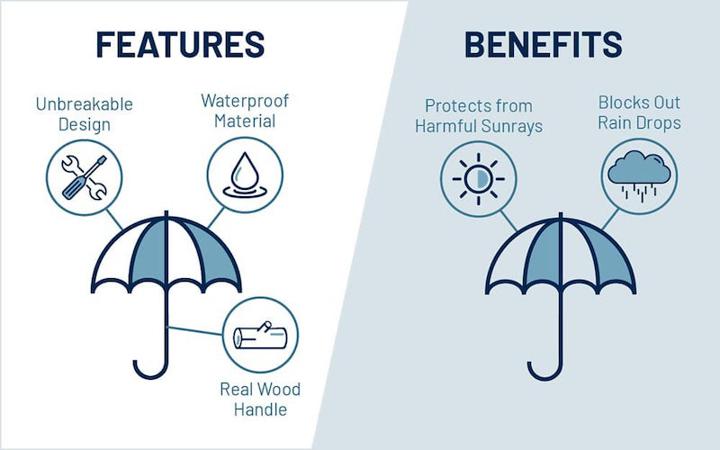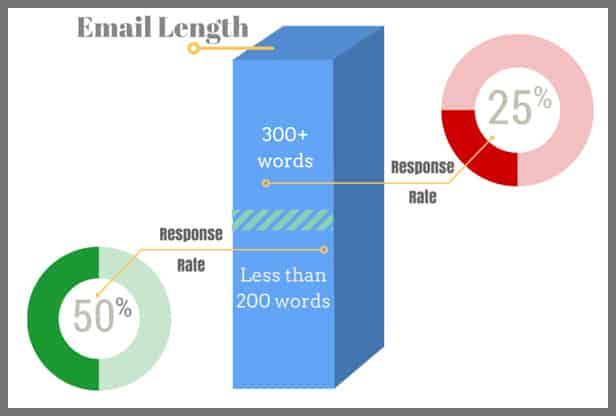Copywriters have serious writing chops, but some may struggle a bit when it comes to outreach.
Conversely, high-performing salespeople know how to connect with their audience but may prefer a discovery call to an email.

Too often, we’re focused on learning from people in our role, but sometimes to get better you need to look for inspiration in unexpected places.
That’s why today we’re sharing three copywriting lessons and three sales lessons.
Let’s jump in.
Copywriting lessons from sales
Even if you’re a skilled copywriter with many years of experience under your belt, you can benefit from taking a few cues from your sales counterparts.
Here are three things you can learn by taking a more sales-oriented approach.
1. Focus on benefits, not features
If you’ve never worked in sales, it’s easy to believe that benefits and features are one and the same. But if you have any sales or product marketing experience, you know that this isn’t the case. You know that it’s better to focus on benefits, not features.
A feature is something your product has or is. For example, an email marketing platform that allows you to set-up autoresponders. Or a table saw that allows you to change blades without any additional tools.
Benefits, on the other hand, focus on the outcome that a user hopes to achieve by using a product or service. In other words, a benefit is a reason why a prospect becomes a customer.

Most people don’t buy because of features. They buy because the benefits can solve one or more of their problems.
When creating content, whether it’s website copy or an order confirmation email, the benefits of your product or service should be the centerpiece. Features may come into play, but in copywriting and sales they should always play second fiddle to benefits.
2. Show passion in your writing
The most successful salespeople are the most passionate. They truly believe in what they’re selling, and as a result, it shows through in everything they do.
Copywriters don’t typically have the opportunity to communicate directly with prospects and customers. Instead, they work behind the scenes to create compelling copy that drives leads and sales.
This often makes it difficult to remain “connected” to the company, product/service, and the sales cycle as a whole.
When you harness your passion and let it show in your writing, it’ll pay off in the long run. This allows you to more efficiently connect with the reader.
3. Remember that empathy matters
This goes along with the point above of focusing so much on writing that you become disconnected from the rest of the marketing and sales cycle.
The best salespeople are empathetic. This allows them to relate to the customer, support them during the sales cycle, and help them make an informed and confident decision.
Kelly Azevedo, a well-known productivity expert and founder of She's Got Systems, puts it best:
Salespeople have to relate to the customer and support them in choosing the right solutions, so personal empathy is an essential quality. It shows up as listening more than talking, relating to the other people in conversation and genuine care for others. The lifetime value of an ideal client is much more important to us than the quick sale, so empathy from the sales team is crucial.
Don’t write for yourself. Write for your audience—but only after you put yourself in their shoes.
When you practice empathy, it’s easier to understand where your audience is coming from, what they’re looking for, and how you can best meet their needs.
A lack of empathy will put readers off, as opposed to drawing them in.
Sales lessons from copywriting
You may not enjoy writing, but that doesn’t mean it’s not important. Becoming a better writer can help you make more sales (and earn more money).
Here are three things you can learn from copywriters.
1. Choppy copy works
Choppy copy. It sounds like a bad thing, doesn’t it? It sounds like content that doesn’t flow, right?
Regardless of how it sounds, it works. The most successful copywriters know that choppy copy is the best way to attract their audience, keep their attention, and give them everything they want (and nothing they don’t).
While choppy copy means something different to everyone, there are some basics to keep in mind:
- Shorter is (almost) always better.
- Proper grammar and sentence structure isn’t always necessary.
- The first line is the most important line.
- It doesn’t have to be perfect.
Maybe you’re the type of salesperson who generates most of your leads (and sales) via cold email. You’ve had some success, but you’re wondering if there’s anything you can do to take things to the next level.
Choppy copy may be just what you need. Let’s take a look at two examples, starting with copy that’s anything but choppy:
Hi Chris,
I hope this note finds you well and you had an enjoyable weekend. I wanted to get in touch with you to discuss our conversation from last week and to see if you have any questions.
As I mentioned, we’re able to meet all your requirements and hope to work with you in the future. If you have any questions or concerns in the meantime, you can reach out to me via email or phone. I am always here to help.
Thanks again,
Jenny
That looks good, right? It’s relatively short and gets the point across (eventually).
But you can do better. Here’s an example of what choppy copy looks like:
Hi Chris,
As promised, I am following up on our phone call last Monday.
I am confident we can meet all your requirements. If you have questions or concerns, shoot me an email or give me a call.
Talk to you soon,
Jenny
The first example is 86 words. The second example is 43 words. That’s a big difference.
It’s half the size but says the same thing. This improves the likelihood of your recipient reading it from start to finish.
The next time you’re writing, make it choppy as opposed to long-winded.
2. Get to the point
This goes hand in hand with writing choppy copy. Nobody wants to read an email, sales letter, or blog post that drags on and on.
They have limited time to get through your content. You need to get to the point and you need to get there fast.
The two examples above show the difference.
In the first example, the first sentence is unnecessary. It does nothing for the email. In fact, it may prompt the person to delete it and move on.
But in the second example, the first sentence tells the person exactly why you’re emailing them.
This gives them a reason to continue reading, especially when they see that the rest of your note is concise.

Data shows that your email length can have a big impact.
Here’s one of my favorite quotes on writing succinctly:
“Vigorous writing is concise. A sentence should contain no unnecessary words, a paragraph no unnecessary sentences, for the same reason that a drawing should have no unnecessary lines and a machine no unnecessary parts. This requires not that the writer make all his sentences short, or that he avoid all detail and treat his subjects only in outline, but that every word tell.” — William Strunk Jr. in The Elements of Style
Keep that in mind the next time you sit down to write. It’s something that the best copywriters have mastered.
3. Don’t shy away from creativity
You’re a salesperson, not a writer. For that reason, it’s easy to shy away from creativity and stick to the basics.
That’s a good thing (see above), but it doesn’t mean your writing has to be “dry.”
Let your creativity show through when applicable. This is particularly important when writing sales copy, such as a sales letter intended to generate a response. Remember, creative copywriting is good!
Creativity comes in many forms:
- Say something that makes you unique
- Explain something that changes the way your prospect sees you and/or your company
- Personalize your content when it's possible.
It’s easy for self-doubt to creep in. After all, you’re a salesperson and writing may not be your “thing.” But if you begin to think like a copywriter, this will fly out the window.
A final sales and copywriting lesson
Here's one final sales and copywriting lesson: Keep looking for inspiration outside of your role.
Copywriters with a sales mindset find it easier to connect with their target audience through engaging content.
Salespeople with copywriting skills have another avenue for effectively selling their product or service and communicating with prospects.
When you’re open to learning, you’ll come to find just how easy it is to transform your career.
About the author
Brooklin Nash runs content at Sales Hacker. Connect with him on LinkedIn.
